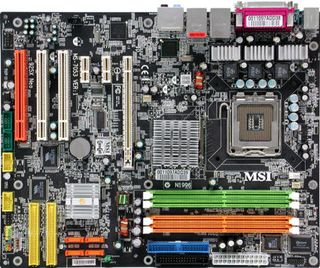Market Survey, Part 2: Six Premium Pentium 4 LGA775 Boards
MSI 925X Neo Platinum (MS-7053) (Intel 925XE)

The 925XE Neo from MSI looks a bit basic for a Platinum Edition.
Board revision: 1
BIOS version: 1.4
The 925XE Neo Platinum showed two different faces in our test. On the one hand, it offers rich functionality; on the other, it seems MSI needs to make a few improvements here and there. The board worked well in the test and will certainly appeal to many users due to its providing all-around good value for the money. We did uncover a few weaknesses in our detailed analysis though.
We liked the slot arrangement and the whole basic layout of the board, and for the amount of extra components on hand, most can be well utilized. The pin panel provides color-coding for the various connections, a higher priority PCI slot is ready and waiting, and the cooling units on the power converters are positioned so that the air stream created by the case fan should be very effective.
Copying a system backup using the BootIT software turned out to be somewhat difficult, as data transfer from one SATA hard drive to another was slower than usual, a problem we did not encounter with any other boards.
MSI offers a multitude of overclocking functions, but their purpose is not always evident. For example, if you select DDR2-600 or DDR2-667 as a memory clock speed, MSI jacks up the front side bus until the desired memory speed can be reached . In practice though, the CPU clock speed is often too high, so that the system sometimes will no longer start. MSI unfortunately does not offer the option of forcing a PRB1 processor up to 2.8 GHz. Also, after a failed attempt at overclocking, the board can only be revived via CMOS reset.
Stay on the Cutting Edge
Join the experts who read Tom's Hardware for the inside track on enthusiast PC tech news — and have for over 25 years. We'll send breaking news and in-depth reviews of CPUs, GPUs, AI, maker hardware and more straight to your inbox.
All high-quality MSI motherboards run on their own proprietary CoreCell chip, which is able to dynamically overclock the system automatically by a desired percentage when placed under a high computing load - similar to how Intel's SpeedStep function clocks the processor down during inactivity. In practice this feature continues to work very well, providing additional computing power when you need it the most: while rendering video or image files, compressing files, etc.
Unfortunately, the overclocking utility was a big hassle. Instead of adjusting the FSB clock speed during operation, the system simply crashed. MSI now only overclocks the front side bus automatically when the "optimized" performance mode is selected in the BIOS. At the same time, however, the graphics card also gets substantially overclocked, of which no mention is made in the BIOS. Users should be able to deliberately make these kind of settings themselves; otherwise, this makes localizing problems that may arise a good deal more difficult.
MSI has taken to throwing around marketing names more than it used to: BuzzFree, LifePro, PowerPro, DOT, CoreCell, and Speedster all sound pretty good, but don't provide much clue as to what their functions are. All in all, MSI needs to eradicate some flaws before we will be able to recommend this board to enthusiasts. It should at least be possible to take care of all the points mentioned via updated BIOS versions. That said, if you are not going to get into excessive overclocking anyway, nothing speaks against going with this board, outside of its moderate storage performance.
| MSI 925XE Neo Platinum (MS-7053) (Rev. 1) | |
|---|---|
| Platform | Sockel LGA775 |
| Northbridge | Intel 925XE |
| Southbridge | Intel ICH6R |
| BIOS | V 1.4 (12/16/2004) |
| Memory | DDRII-333 to 533 |
| Interfaces | |
| Connectors | onboard/panel |
| USB 2.0 | 4 / 4 |
| IEEE1394/Firewire | 1 / optional |
| Serial COM Port | 1 / none |
| Parallel LPT Port | 1 / none |
| Game | none / none |
| LAN | 2 / none |
| WLAN | none / none |
| SATA | 4 / none |
| Audio analog | 5 / none |
| Audio digital | 2 / none |
| Connectors | onboard only |
| PCIe 16x | 1 |
| PCIe 1x | 2 |
| PCI | 3 |
| IDE (PATA) | 3 (6 channels) |
| Fan 4 pins (CPU) | 1 |
| Fan 3 pins (System) | 2 |
| Mass Storage Controller | |
| ICH6R | 2x IDE (ATA100)4x SATA (RAID 0,1,0+1) |
| VIA VT6410 | 2x IDE (ATA133 RAID 1,0,0+1) |
| LAN | |
| Broadcom BCM5751 | 1x 1 Gbit/s LAN |
| Intel 82562EZ | 1x 100 Mbit/s LAN |
| Audio | |
| C-Media CMI9880 7.1 | AC97 |
| IEEE1394/Firewire | |
| VIA VT6306 | 3x 1394a (400 Mbit/s) |
| Clock Setting in BIOS | Measurement |
|---|---|
| 200.0 MHz (FSB800) | 199.9 MHz (+0.00 %) |
| 266.6 MHz (FSB1066) | n/a |
| SPD Memory Timing Recognition | Timing Result |
| FSB800 setting | Cl 3.0-3-3-6 |
| FSB1066 setting | n/a |
Current page: MSI 925X Neo Platinum (MS-7053) (Intel 925XE)
Prev Page Gigabyte GA-8I925XE-G, Continued Next Page MSI 925X Neo Platinum, ContinuedMost Popular

